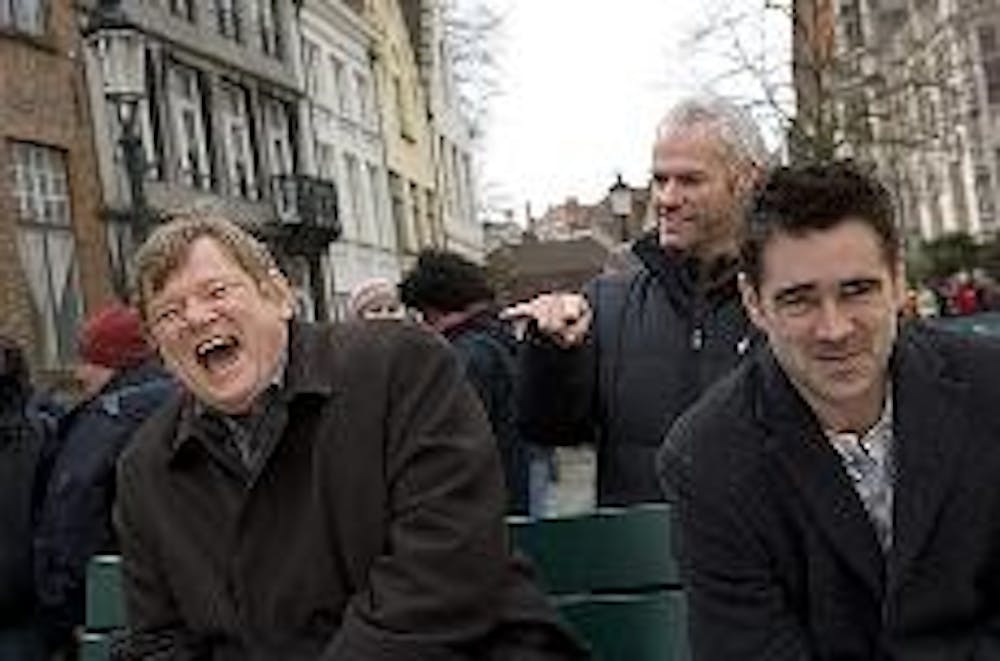When last seen gracing the celluloid of a major motion picture, Colin Farrell's greasy mug was playing Sonny Crocket in the forgettable screen adaptation of "Miami Vice." Since then, the star has landed his body in rehab and appeared to push his career into a state of similar purgatory. More so than his co-stars, Oscar-nominated British luminary Ralph Fiennes and veteran character actor Brendan Gleeson, Farrell needed a film like "In Bruges."
Since his emergence as a bankable Hollywood star supporting Tom Cruise in "Minority Report," American audiences have been treated to a laundry list of bland performances by the Irish performer that ranged from the mundane ("S.W.A.T." and "Daredevil") to the absurd ("Alexander").
Judging by the zany TV trailers, audiences would expect another one-note performance echoing Brad Pitt's gypsy character in Guy Ritchie's "Snatch." Each clip of off-beat non-sequiturs in his native accent shows Farrell in a situation more whimsical than the one preceding, and by no means do those misstate the hilarity of this story about two English hitmen lying low in a historical Belgian town.
It is, without question, one of the most quotable movies of the decade. But this marketing campaign belies a film that is emotionally complex and whose characters carry heavy baggage.
The tourist town of Bruges-with its cap-gun wielding Belgian grifters, lisping Eastern European gun-runners and racist, cocaine-loving American midgets-serves as a comedic cut to the tension of what is essentially a character study. Although Farrell's rookie hitman Ray serves as the nominal protagonist in the film, he is in many ways the most repugnant and least accessible of the three.
Ray carries a secret from his first job with him to Belgium that causes schizophrenic outbursts ranging from suicidal sadness to glib apathy toward his more thoughtful partner Ken (Gleeson). Ken is fine playing the straight Costello to Ray's unpredictable Abbott, but ultimately his boss Harry (Fiennes) puts him in a morally taxing situation that strains the relationship with his partner.
This interplay between Ray and Ken is where director Martin McDonagh really shines. In the middle act, sandwiched between a maudlin opening (the music alone was reminiscent of "The English Patient") and a somewhat clichéd climax, Ken and Ray talk often about the social, religious and moral ramifications of their actions.
Too often, star-studded gangster vehicles feature characters who care little about their actions and more about the body count and kitschy one-liners. Farrell's Ray is surely glib, but not about his work. He has no trouble blinding a potential thief and berating him for using a gun with blanks. When he shines the light inward though, he reveals himself a shattered man.
This is the revelation about Farrell. He makes the audience like him even though he is unpredictable, and he makes the audience care about him even though he is unforgivable. His performance is chiefly why "In Bruges" elevates itself over similarly dark comedic gangster tales like the aforementioned "Snatch"; it offers a more realistic take on a genre that is brutal, bleak and shouldn't necessarily wrap up nicely.
Those who come along for the ride will discover gangsters who abide by a unique set of values, gangsters who would eat a bullet before hitting a bystander and gangsters who have no trouble punching bottle-wielding, middle-aged Canadian housewives while debating the Vietnam War. If movies like "In Bruges" are the result of Colin Farrell's rehab center vacations, maybe he should take such leaves of absence more often.





